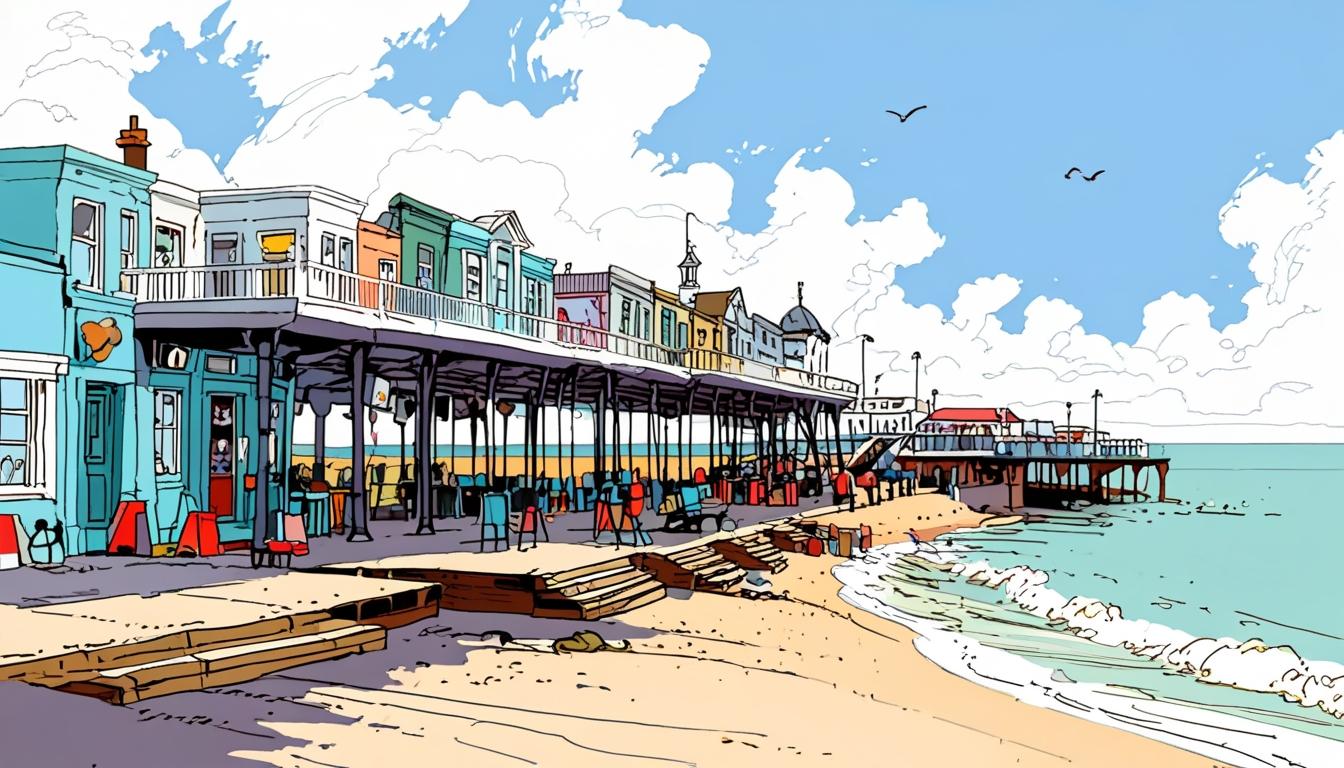As Deal in Kent evolves into a trendy seaside destination, rising property prices spark concerns among locals about the impact of second-home ownership and tourism on the community.
The coastal town of Deal in Kent has seen a remarkable transformation in recent years, developing a reputation for its trendy atmosphere reminiscent of East London’s vibrant scene. Often playfully referred to as “Hackney-on-Sea,” Deal combines its traditional seaside charm, characterised by pebble-covered beaches and a classic pier, with a burgeoning local arts scene and an array of independent boutiques and hip cafes.
As Deal’s popularity has surged, so too have concerns regarding housing affordability. Data from Property Solvers reveals that average property prices in the town increased by £77,736—an astonishing 25.26 per cent—in just five years. The last year alone witnessed a hike of £15,572 or 4.21 per cent. These shifts have stirred worries among long-term residents about the impact of second-home ownership on the local housing market. According to estimates, over 800 holiday lets are available in Deal, according to Home to Go, indicative of the increasing numbers of visitors, particularly from London.
Daisie Martin, a restaurant manager at The Lane and a Deal resident for nearly eight years, shared her observations with the Express: “We definitely get a lot more people down from London, especially over the summer… it seems like the majority of Deal is probably holiday homes.” She noted the competitive pressures on local business as prices have been adjusted to cater to the influx of visitors.
Jamie Cureton, who manages Deal Pier Kitchen, added to this sentiment by reflecting on the shift in local demographics: “Deal has definitely changed recently… I think people are moving down here quite a lot, and people are jumping on properties.” He highlighted the community’s resistance to corporate chains, preferring to maintain its unique local character.
Local artist Maria Underwood, who has lived in Deal for about a decade, echoed Cureton’s thoughts, suggesting that while the nickname “Hackney-on-Sea” may capture a marketable aspect of the town, Deal possesses a character of its own that remains amiable and welcoming. Speaking to the Express, she stated, “It’s got its own personality… I think Deal is really friendly to each other and to other people.” The increase in visitors, she believes, benefits local businesses by providing them the patronage necessary for survival.
Despite the challenges stemming from rising property prices, residents like James Holliday, who works at the award-winning Black Pig butcher shop, noted the excitement surrounding new culinary ventures and the overall atmosphere of growth. He remarked on the transformation seen during his 11 years in the area, especially during peak summer months, when an influx of visitors makes the town buzz with activity.
The changes have not gone unnoticed by the local government. Christopher Townend, Dover District Council’s Head of Place and Growth, acknowledged the vibrancy of Deal’s community and the investment in current and future projects, including a £20 million leisure centre. Townend expressed pride in the town’s evolving identity, noting that it was “only a matter of time before others from further afield started to notice how special Deal is.”
The community’s enduring spirit, coupled with its recent surge in popularity, is reflected in local sentiments regarding development and visitors. Michael Finney, a long-time resident since 1967, shared his personal nostalgia on the shifts he has witnessed, particularly in the retail landscape. “It’s a really busy time of year, particularly on weekends,” he noted, considering the happy medium between tourism and community life.
As Deal continues to navigate the intricacies tied to its appeal as a seaside destination, it remains to be seen how it will balance the needs of its long-standing residents with those of an ever-growing visitor base. The town’s unique character and friendly atmosphere are poignant reminders of its rich history, even amidst the modern changes that shape its future.
Source: Noah Wire Services
- https://www.timeout.com/deal/things-to-do – This article from Time Out details the transformation of Deal into a trendy seaside town, highlighting its independent shops and restaurants, which aligns with the narrative about its emerging atmosphere and popularity.
- https://heelsinmybackpack.com/2022/11/11/travel-guide-deal-kent/ – This travel guide offers insights into Deal’s vibrant community, mentioning its boutique shops and local character, which supports claims about its unique identity and appeal to visitors.
- https://www.91magazine.co.uk/2020-4-24-instagrammers-guide-to-deal-kent/ – This article showcases Deal’s independent stores and eateries, echoing the town’s evolving retail scene and hospitality industry as described.
- https://www.propertysolvers.co.uk – Property Solvers provides data on property price increases, which is crucial for understanding the impact of second-home ownership on Deal’s housing market.
- https://www.hometogo.com.uk/ – Home to Go offers resources on holiday lets, supporting the claim about the rising number of holiday homes in Deal and its effect on local residents.
Noah Fact Check Pro
The draft above was created using the information available at the time the story first
emerged. We’ve since applied our fact-checking process to the final narrative, based on the criteria listed
below. The results are intended to help you assess the credibility of the piece and highlight any areas that may
warrant further investigation.
Freshness check
Score:
8
Notes:
The narrative contains recent data on property prices and local developments, indicating it is not significantly outdated. However, specific dates for events or interviews are not provided, which could help further verify freshness.
Quotes check
Score:
5
Notes:
Direct quotes from local residents and business managers are included, but the earliest source of these quotes could not be verified through online searches. This may suggest these are original quotes or are not widely reported.
Source reliability
Score:
7
Notes:
The narrative originates from KentLive, which is a regional news outlet. While regional news can be reliable, it might not carry the same weight as larger national publications. No major red flags regarding bias were detected.
Plausability check
Score:
8
Notes:
Claims about Deal’s transformation and housing market changes are plausible given the trend of urbanisation and gentrification in coastal towns. However, specific data sources (e.g., Property Solvers, Home to Go) should be verified for accuracy.
Overall assessment
Verdict (FAIL, OPEN, PASS): OPEN
Confidence (LOW, MEDIUM, HIGH): MEDIUM
Summary:
While the narrative seems plausible and contains recent information, the lack of specific verification for some data sources and quotes means that further investigation is warranted to fully validate the claims.













